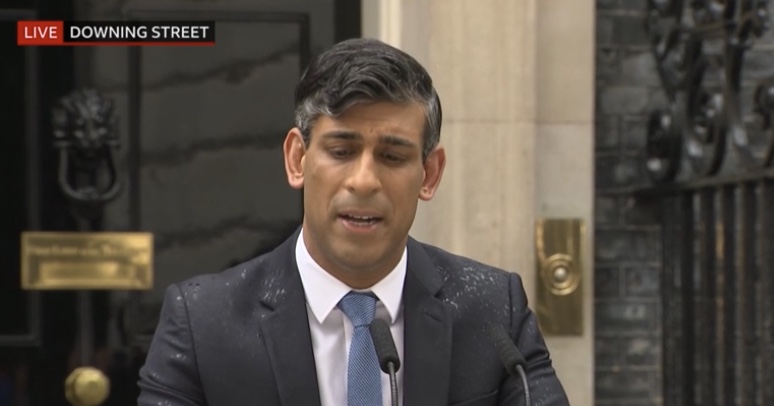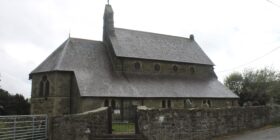Rishi Sunak announces general election on July 4

In a move that has taken many by surprise, Prime Minister Rishi Sunak has announced that a general election will be held on 4 July. This announcement comes after months of speculation regarding the election date, with Sunak previously indicating that it would occur in the second half of the year.
Cabinet members were seen arriving at Downing Street at 4:15 PM for a meeting ahead of the announcement. Speaking outside Number 10, Sunak stated, “I spoke with His Majesty the King to request the dissolution of Parliament. The King has granted this request, and we will have a general election on the 4th of July.”
Sunak’s speech highlighted the critical global challenges currently facing the UK, including the ongoing war in Ukraine, energy security risks, Islamist extremism in the Middle East, and the strategic ambitions of China.
“This election will take place at a time when the world is more dangerous than it has been since the end of the Cold War,” Sunak said. “Putin’s Russia is waging a brutal war in Ukraine and will not stop there if he succeeds. That war has also made it all too clear the risks to our energy security.”
“In the Middle East, the forces of Islamist extremism threaten regional and ultimately global stability. These tensions are exploited by extremists who seek to undermine our values and define our society here,” he continued. “China is looking to dominate the 21st century by stealing the lead in technology, and migration is being weaponised by hostile states to threaten the integrity of our borders.”
Sunak emphasised the need for decisive leadership to navigate these turbulent times. “These uncertain times call for a clear plan and bold action to chart a course to a secure future. You must choose in this election who has the resolve to take the bold action necessary to secure a better future for our country and our jobs.”
The announcement comes at a time when Labour, led by Keir Starmer, is significantly ahead in the polls, with a lead of around 20 points.
Welsh Labour Leader, Vaughan Gething said:
“Rishi Sunak has finally come to the same conclusion as the rest of the country, a General Election is needed now.
“People across Wales are calling out for a change of government, an end to Tory chaos and two Labour governments working together for Wales and Britain.”
The seat of Alyn and Deeside will be expanded at the election as a result of the axing of the Delyn constituency.
Alyn and Deeside has seen several prospective candidates indicate their names will be on the ballot paper.
| Taghrid Al-Mawed |
Workers Party of Britain | Alyn and Deeside | |
| Paul Ashton |
Abolish The Welsh Assembly Party | Alyn and Deeside | |
| Karl MacNaughton |
Green Party | Alyn and Deeside | |
| Daniel McNay |
Social Democratic Party | Alyn and Deeside | |
| Jack Morris |
Plaid Cymru – The Party of Wales | Alyn and Deeside | |
| Vicky Roskams |
Reform UK | Alyn and Deeside | |
| Mark Tami |
Labour Party | Alyn and Deeside |
The Delyn constituency, a seat which has been held by Independent MP Rob Roberts will now see eight Vale of Clwyd wards and three Clwyd West wards included.
The changes mean Holywell and Northop join the likes of Llangollen in a new constituency named Clwyd East.
A number of prospective candidates have indicated their names will be on the ballot paper Clwyd East ballot paper.
| Alec Dauncey |
Liberal Democrats | Clwyd East | |
| James Davies |
Conservative and Unionist Party | Clwyd East | |
| Becky Gittins |
Labour Party | Clwyd East | |
| Lee Lavery |
Green Party | Clwyd East | |
| Paul Penlington |
Plaid Cymru – The Party of Wales | Clwyd East |
What Happens in Parliament After Election is Called?
Once an election is called, Parliament continues to sit until it is either dissolved or prorogued, and then dissolved. This period is known as ‘wash-up’. For this election, Parliament will continue to sit until it is dissolved on 30 May, resulting in a five-day wash-up period.
Wash-up is an essential phase where Parliament rushes to complete any unfinished business before dissolution. This usually involves rapidly passing legislation through Parliament with cooperation between parties to agree on which bills to expedite. Any parliamentary business not completed by the end of wash-up will not become law and cannot be carried over into the next Parliament.
The length of wash-up is decided by the Prime Minister and can vary. The longest wash-up period since 1992 occurred in 2017, lasting seven days after the election was called.
Dissolution of Parliament
Dissolving Parliament is a royal prerogative exercised on the advice of the Prime Minister. When Parliament is dissolved, all business in the House of Commons ends, and every seat in the House becomes vacant, meaning there are no longer any MPs. However, government ministers remain in post until a new government is formed after the election. Members of the House of Lords retain their positions, but all business in the House ceases.
Polling day is scheduled 25 working days after Parliament is dissolved. For this election, that means there are 35 days between dissolution and polling day on Thursday, 4 July. While polling day has traditionally been on a Thursday since 1935, the Prime Minister could theoretically choose any day for the election.
Government Activity During the Election Campaign
Government activity is restricted during the election campaign, in a period known as the ‘pre-election period’ (previously known as purdah). This is to ensure public money is not used to support the party in power and to maintain the impartiality of the civil service. These restrictions typically begin once Parliament is dissolved but can start earlier, as was the case in 2017.
Manifestos and TV Debates
There is no fixed date for manifesto launches; parties decide when to release them. Since 1997, Labour and Conservative manifestos have typically been launched between 18 and 29 days before the election, likely between 5 and 16 June for this election.
Televised debates have become a staple of UK election campaigns since 2010. The format and timing are negotiated between political parties and broadcasters, ranging from head-to-heads between main party leaders to multi-party debates. Participation is voluntary; for instance, Theresa May opted out of debates in 2017.
Polling Day Procedures
On polling day, 4 July, voting can be done in person at polling stations from 7am to 10pm or by post beforehand. For the first time in a general election, photographic ID will be required for in-person voting. After the polls close at 10pm, an exit poll is announced, surveying voters from around 150 constituencies in England, Scotland, and Wales. Exit polls have correctly predicted the largest party in every general election since 1974.
As the election approaches, these procedures ensure a structured and fair process, culminating in the formation of a new government based on the will of the voters.
Spotted something? Got a story? Send a Facebook Message | A direct message on Twitter | Email: [email protected]Latest News









